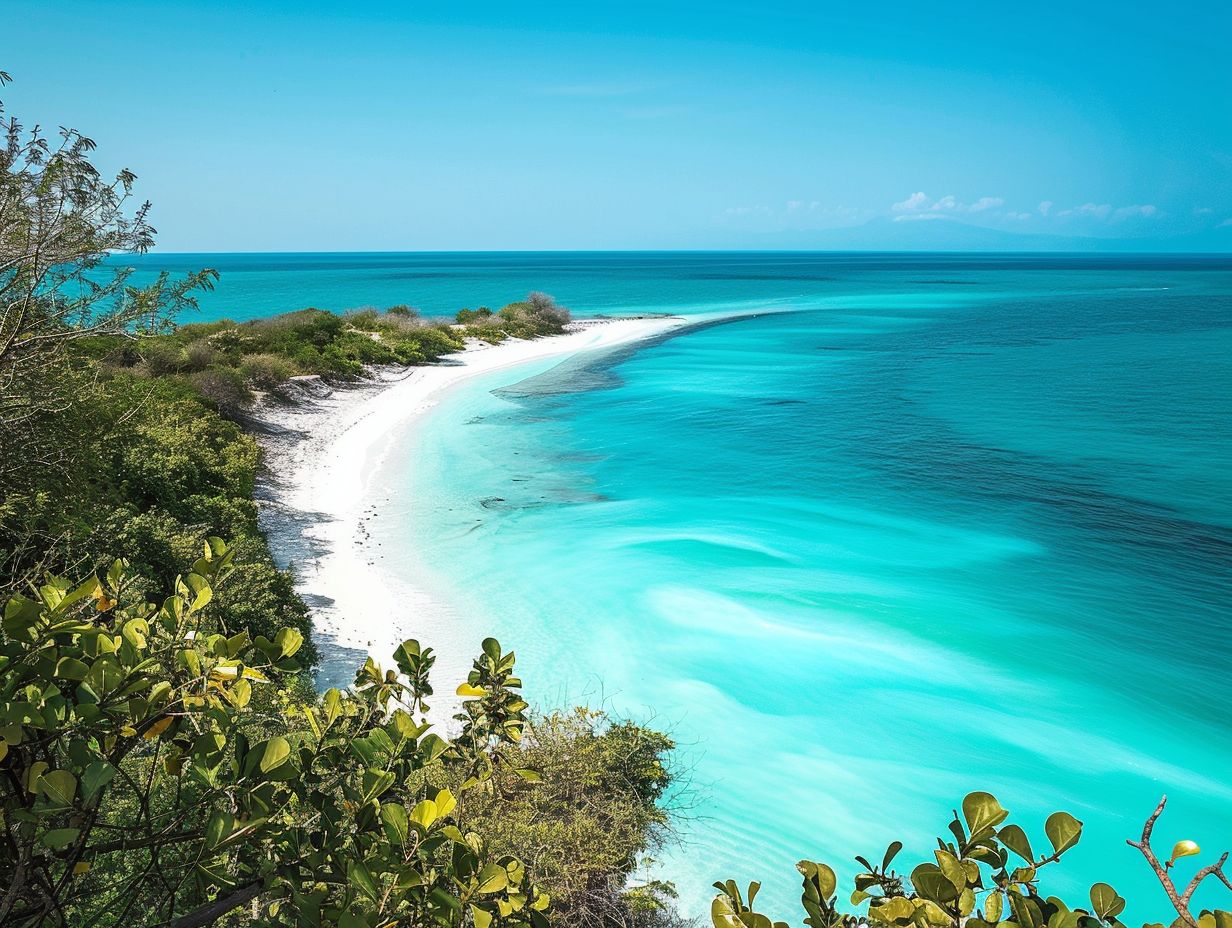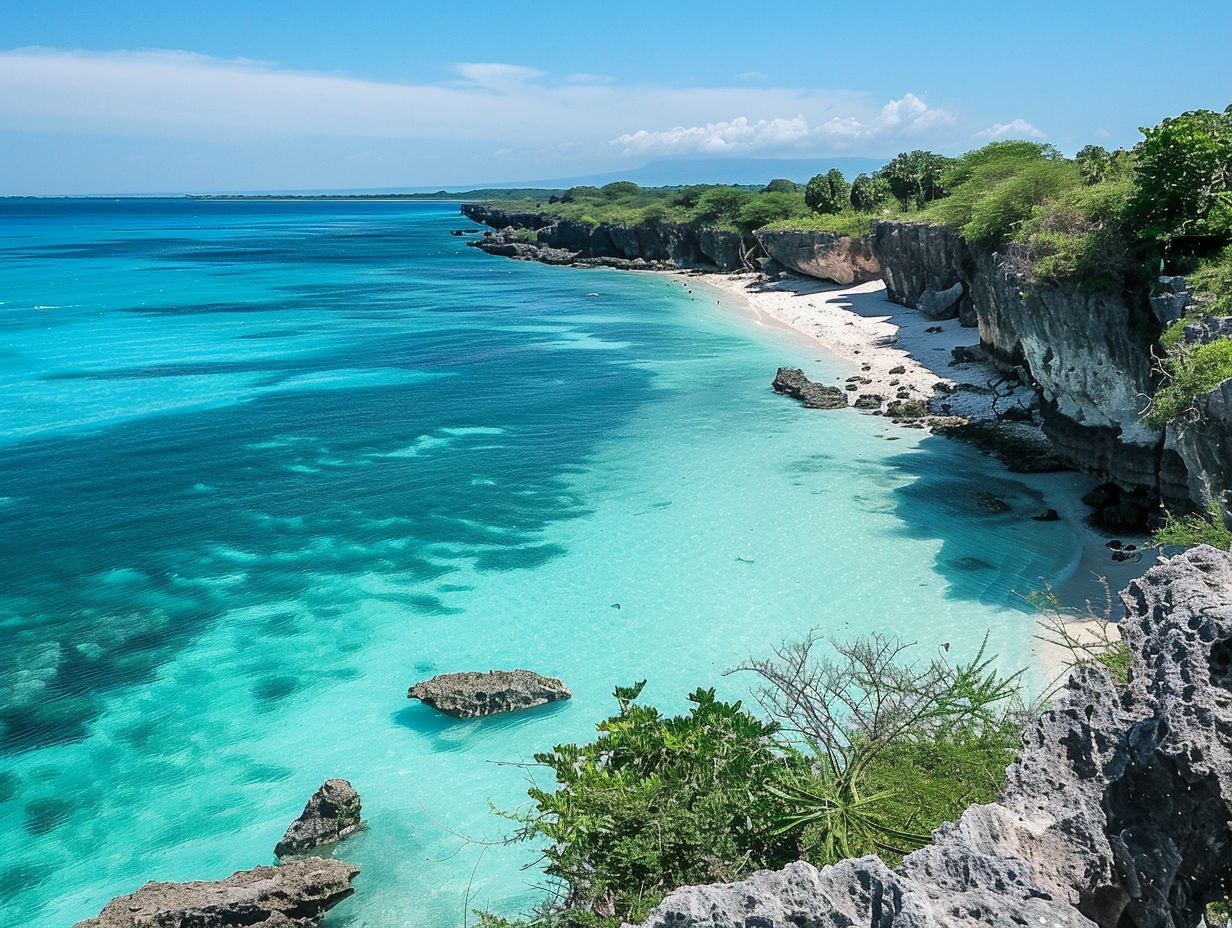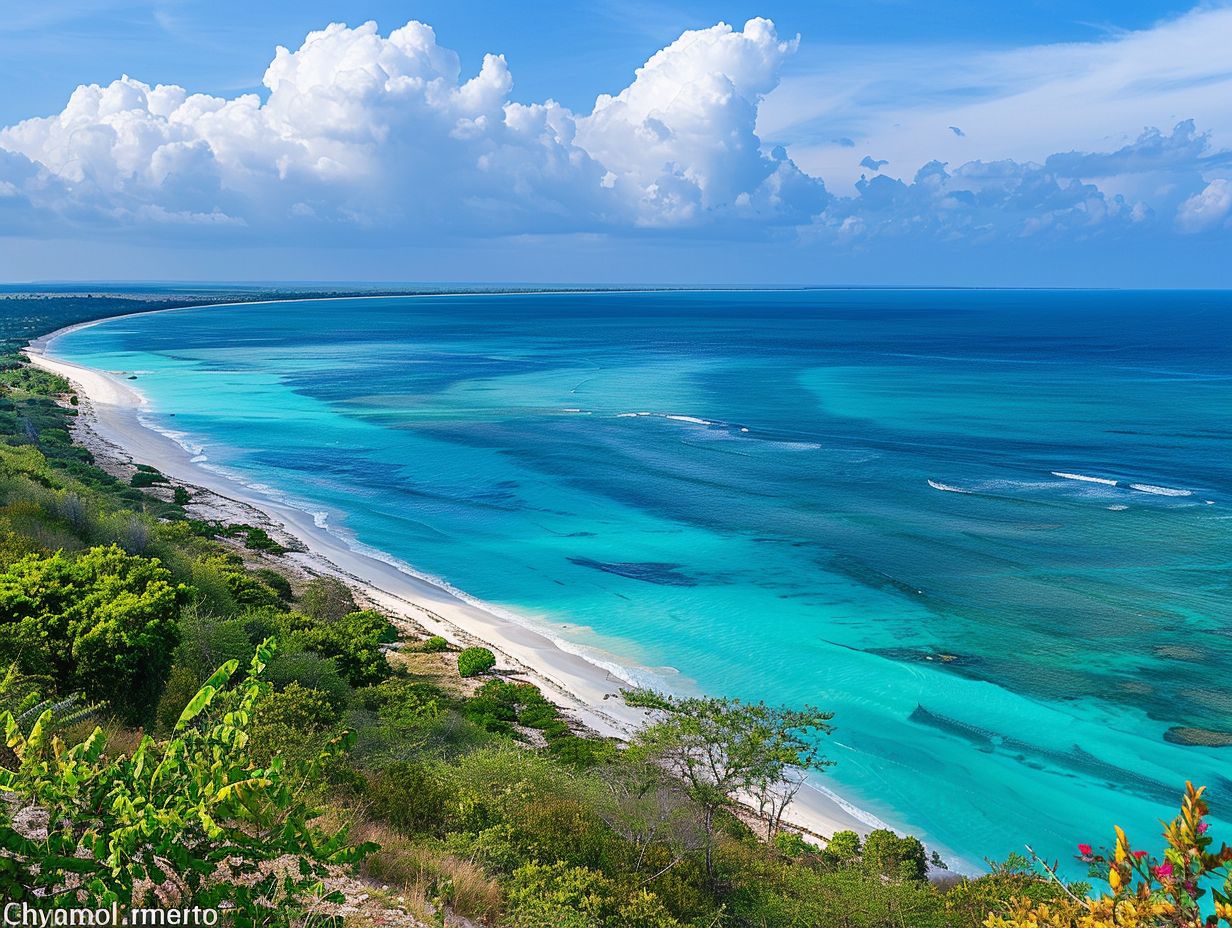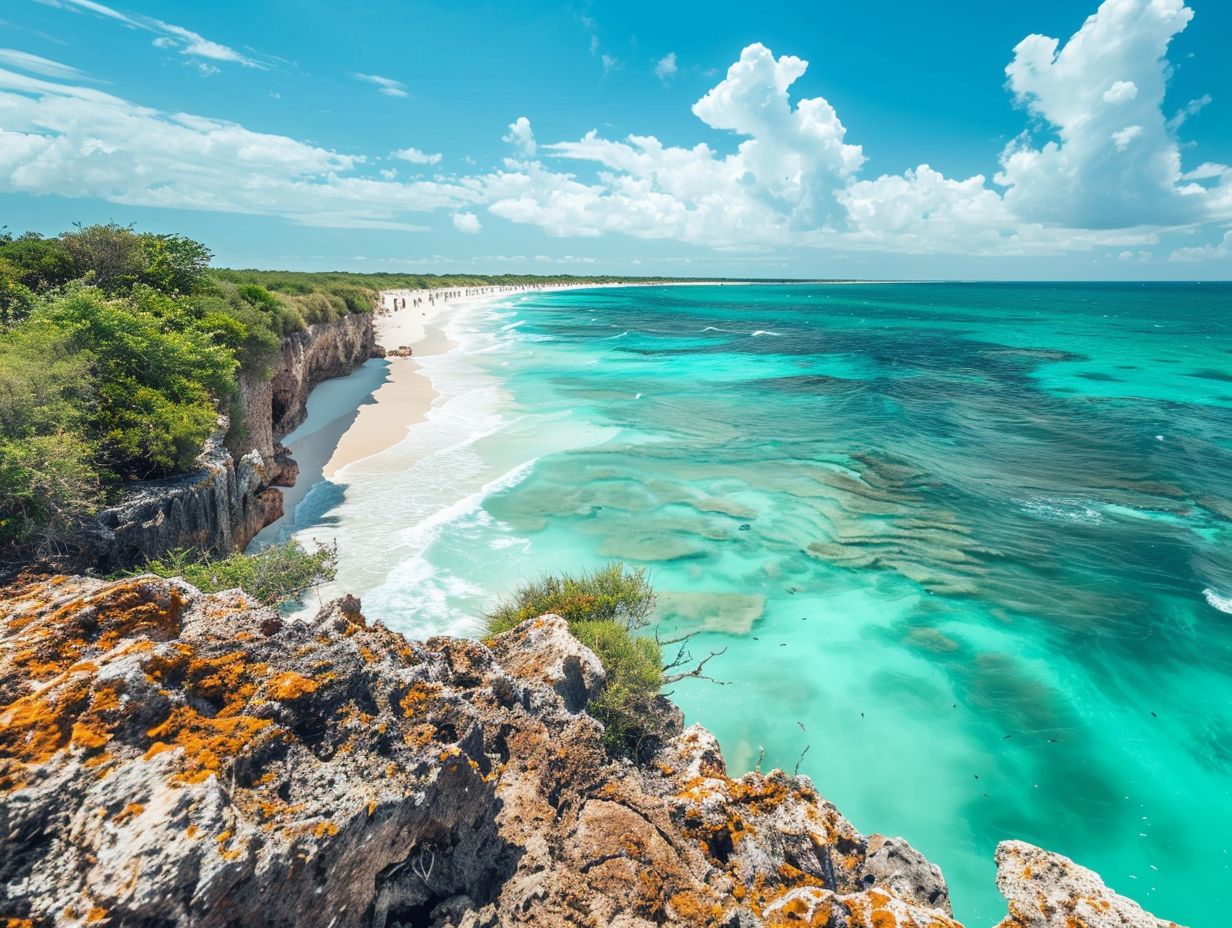
Pemba Island
Located off the coast of Tanzania, Pemba Island is a hidden gem waiting to be explored.
In this comprehensive article, we will dive into the location and geography of Pemba Island, including its size and topographical features.
We will also uncover the rich history and cultural influences that shape this island, as well as the top tourist attractions and activities to enjoy.
Discover the conservation efforts being made to preserve Pemba Island’s natural resources and learn how to get there for an unforgettable experience.
Key Takeaways:

- Pemba Island is a small island located in the Indian Ocean, known for its diverse topography and traditional practices.
- The island has a rich history influenced by Arab, Portuguese, and Swahili cultures.
- Tourists can enjoy various attractions and activities on the island while also supporting conservation efforts to preserve its natural resources.
Location and Geography of Pemba Island
Pemba Island is a picturesque island located in the Indian Ocean, part of the Zanzibar Archipelago off the coast of Tanzania. Known for its fertile land and lush vegetation, it thrives on agriculture, particularly cloves. The strategic location of Pemba Island in the Indian Ocean has played a vital role in its history and development.
Where is Pemba Island located?
Pemba Island is situated in the Indian Ocean, specifically within the Zanzibar Archipelago off the coast of Tanzania. Its geographic coordinates place it as a prominent island in the region.
Pemba Island, with coordinates approximately 5.25°S latitude and 39.77°E longitude, lies about 50 kilometers to the north of Zanzibar Island.
Known for its lush green landscapes and crystal-clear waters, Pemba Island is often referred to as the ‘Green Island’ due to its rich vegetation and unspoiled natural beauty.
The island serves as a haven for diving enthusiasts, with its coral reefs and diverse marine life, making it a popular destination for eco-tourism and underwater exploration.
What is the size of Pemba Island?
Pemba Island boasts a land area of X square kilometers, making it the second-largest island in the Zanzibar Archipelago. Its size contributes to the diverse topography and ecosystems.
With a land area of approximately X square kilometers, Pemba Island stands out as a significant landmass within the Zanzibar Archipelago.
The expansive dimensions of Pemba Island provide ample space for lush forests, mangrove swamps, and fertile valleys to thrive, offering a diverse range of habitats for an array of flora and fauna.
This diverse topography, influenced by the island’s comparative size, creates a rich tapestry of natural beauty and biodiversity.
What are the topographical features of Pemba Island?
Pemba Island showcases a diverse range of topographical features, including rolling hills, lush forests, and pristine beaches. The island’s landscape offers a blend of scenic beauty and natural wonders.
As you venture inland, you’ll be greeted by the undulating hills that provide panoramic views of the surrounding areas. The verdant forests are a habitat to a rich variety of flora and fauna.
Meanwhile, the crystal-clear waters caress the sandy shores of the beaches, inviting visitors to indulge in relaxation and water activities.
One of the unique geological aspects of Pemba Island is its karst topography, characterized by limestone formations and underground caves that fascinate adventurers.
History and Culture of Pemba Island
The history and culture of Pemba Island are deeply intertwined, with a rich heritage dating back centuries. From the cultivation of cloves to the preservation of ju ju traditions, the island’s past continues to shape its vibrant cultural identity.
Pemba Island’s cultural evolution can be traced through key milestones that highlight its unique blend of traditions and influences.
Over the centuries, the island has been a melting pot of different cultures, including Swahili, Arab, and Portuguese, each leaving their mark on its customs and practices.
The cultivation of cloves played a pivotal role in shaping the local economy, establishing Pemba Island as a major player in the spice trade industry.
This industry not only brought wealth to the island but also fostered connections with other regions, contributing to its cosmopolitan outlook.
These practices, ranging from healing rituals to ceremonies honoring ancestors, continue to be upheld with reverence, showcasing the resilience of Pemba’s cultural heritage.
What is the history of Pemba Island?
Pemba Island has a storied past that reflects a blend of influences from Africa, the Middle East, and the Indian subcontinent.
Archaeological sites on the island offer insights into its ancient civilizations, while the island’s administration plays a crucial role in preserving its heritage.
Over the centuries, Pemba Island has been a melting pot of cultures, evident in its diverse architectural styles, including Swahili and Arab influences.
The island’s rich history is also intertwined with significant cultural exchanges, seen in various traditional practices, music, and arts.
Notably, the Fort of Mkama Ndume, an ancient structure that served as a defense post, stands as a symbol of the island’s past struggles and triumphs.
What are the cultural influences on Pemba Island?

The cultural tapestry of Pemba Island is woven with influences from diverse regions, including Arabic traditions and practices. Tourism plays a significant role in showcasing the island’s unique culture.
As visitors traverse the vibrant streets of Pemba Island, they encounter a fusion of Arabic architecture, Swahili language, and local customs that create an immersive cultural experience.
The traditional dhows sailing off the coast reflect centuries-old maritime traditions passed down through generations. The lively markets brim with spices, fabrics, and crafts.
Interactions with tourists have led to a cultural exchange that has further diversified and enriched Pemba’s identity. Local music, dance, and cuisine have evolved to cater to global tastes.
This blend of old-world charm and modern influences gives Pemba Island a dynamic and alluring cultural allure that continues to captivate visitors from around the world.
What are the traditional practices and beliefs of Pemba Island?
Traditional practices and beliefs hold a significant place in the hearts of Pemba Island residents, with rituals and ceremonies often centered around the mystical Masingini Ridge.
The island’s ju ju traditions are deeply ingrained in the local culture. These ancient customs are not just a remnant of the past; they are intricately woven into the fabric of daily life on the island.
From birth to death, traditional rituals guide the islanders, bringing them closer to their ancestors and the spirits believed to inhabit the land.
Ceremonies around Masingini Ridge, with their rhythmic dances and chanting, exemplify the vitality and endurance of these age-old traditions.
The juju traditions, with their mystical symbols and protective amulets, offer solace and spiritual protection in a world filled with uncertainties.
Tourism in Pemba Island
Tourism in Pemba Island offers a tapestry of experiences for travelers, from exhilarating scuba diving adventures in the crystal-clear waters to luxurious stays at boutique hotels.
The island beckons to visitors with its diverse activities and warm hospitality.
As the sun casts a golden glow over the pristine coastline, the allure of Pemba Island unfolds, captivating adventurers and leisure-seekers alike.
Whether exploring vibrant coral reefs teeming with marine life or unwinding on secluded sandy beaches, the island promises a seamless blend of excitement and relaxation.
Imagine savoring fresh seafood delicacies under the open skies or indulging in rejuvenating spa treatments amidst lush tropical gardens.
What are the popular tourist attractions in Pemba Island?
Pemba Island boasts a plethora of popular tourist attractions, including the renowned Important Bird Area and the enchanting Kidike flying fox sanctuary.
These natural wonders draw visitors seeking to immerse themselves in the island’s biodiversity.
The Important Bird Area on Pemba Island is a birdwatcher’s paradise, with over 200 bird species inhabiting the area, including the endangered Pemba green pigeon and the elusive Pemba scops owl.
This biodiversity hotspot not only mesmerizes bird enthusiasts but also plays a crucial role in conservation efforts, highlighting the importance of preserving these delicate ecosystems.
Another must-visit attraction is the Kidike flying fox sanctuary, home to a large population of the endangered Pemba flying fox.
Visitors can witness these fascinating creatures in their natural habitat, raising awareness about the conservation of these endemic bats.
The sanctuary serves as a vital hub for research and education, showcasing the island’s commitment to protecting its unique flora and fauna.
What are the best activities to do in Pemba Island?
Engaging activities await travelers in Pemba Island, with scuba diving adventures in the azure waters and deep-sea fishing expeditions offering thrilling experiences.
The island’s rich marine life beckons enthusiasts to explore its underwater wonders.
Scuba diving in Pemba Island is a mesmerizing journey through the crystal-clear waters, revealing vibrant coral reefs teeming with a kaleidoscope of marine creatures.
Explorers can witness majestic sea turtles gliding gracefully alongside schools of colorful fish, creating a captivating underwater spectacle.
For those seeking an adrenaline rush, deep-sea fishing off the coast of Pemba promises an exhilarating experience as anglers tackle powerful game fish such as marlin, tuna, and sailfish.
The thrill of battling these mighty creatures against the backdrop of the open ocean is unmatched.
What are the accommodations options in Pemba Island?
Accommodation choices on Pemba Island cater to diverse preferences, from luxury stays at the exquisite Fundu Lagoon to cozy retreats at charming boutique hotels.
Travelers can indulge in the island’s hospitality while basking in comfort and tranquility. At Fundu Lagoon, guests are treated to a luxurious experiences.
The resort offers exclusive villas and suites, each with its own unique style and breathtaking views of the Indian Ocean.
For those seeking a more intimate stay, boutique hotels on the island provide a cozy ambiance with personalized service and attention to detail.
These accommodations blend traditional Swahili architecture with modern comforts, creating a warm and inviting atmosphere for visitors.
Conservation Efforts in Pemba Island
Conservation efforts in Pemba Island play a vital role in safeguarding its natural resources and preserving the delicate balance between agriculture and ecology.
By implementing sustainable farming practices and promoting biodiversity conservation, the community on the island ensures long-term economic viability.
The symbiotic relationship between ecological preservation and economic growth is evident in Pemba’s successful eco-tourism ventures.
What are the conservation challenges faced by Pemba Island?

Pemba Island grapples with conservation challenges that stem from the intricate relationship between agricultural practices and environmental preservation.
Balancing the needs of farming communities with ecological sustainability poses a significant hurdle for conservation efforts.
One of the key complexities facing Pemba Island is the impact of agricultural activities on its unique ecosystem. Deforestation, soil degradation and water pollution have affected the biodiversity.
These environmental concerns threaten the delicate balance that sustains diverse flora and fauna on the island. The rapid expansion of agriculture encroaches on natural habitats.
What are the initiatives taken to preserve the natural resources of Pemba Island?
Initiatives aimed at preserving the natural resources of Pemba Island encompass sustainable practices in spice farms and biodiversity conservation efforts.
These proactive measures seek to protect the island’s unique ecosystems while supporting local livelihoods.
One key sustainable practice implemented in the spice farms on Pemba Island is the utilization of organic farming techniques, minimizing the use of harmful chemicals and promoting soil health.
Biodiversity conservation efforts on the island involve creating protected areas and establishing corridors to allow for the free movement of wildlife.
By safeguarding habitats and species, these initiatives play a crucial role in maintaining the ecological balance of the island.
What are the effects of conservation efforts on the local community?
Conservation efforts on Pemba Island have ripple effects on the local community, influencing economic opportunities, sustainable practices, and community resilience.
The symbiotic relationship between conservation and community well-being underscores the significance of these initiatives.
Residents of Pemba Island have embraced innovative sustainable practices to ensure the preservation of their natural resources while creating economic opportunities.
Through initiatives like eco-tourism and sustainable fishing practices, the community is generating income in a way that is environmentally responsible.
The commitment to conservation has also led to an increase in community resilience, as locals have developed skills and knowledge for adapting to changing environmental conditions.
By integrating conservation efforts with community welfare, Pemba Island is setting an example for sustainable development and creating a brighter future for generations to come.
How to Get to Pemba Island
Accessing the idyllic shores of Pemba Island involves navigating through convenient transportation options, including flights to Wawi Airport and Karume Airport.
Wawi Airport, located in Pemba, serves as a vital gateway for those flying into the island. Its modern facilities and efficient services cater to incoming tourists.
On the other hand, Karume Airport, situated in Chake-Chake, offers another entry point with its well-connected flights.
To access Pemba Island hassle-free, visitors should secure a valid visa, which can typically be obtained upon arrival or through prior application depending on their nationality.
Being informed about the visa regulations beforehand is crucial for a smooth travel experience.
What are the transportation options to get to Pemba Island?
Travelers can reach Pemba Island via convenient air transport services that connect to Wawi Airport and Karume Airport. These well-connected airports serve as gateways to the island.
Wawi Airport, situated in the north, acts as a vital hub for domestic flights within Tanzania and international connections to nearby countries.
On the other hand, Karume Airport, located in the south, provides additional options for travelers, ensuring flexibility in travel schedules.
Connections from major cities like Dar es Salaam and Zanzibar to Wawi Airport and Karume Airport are readily available, making it convenient for travelers to plan their journeys.
Flight timings are well-coordinated to accommodate various schedules and preferences, catering to the diverse needs of visitors to Pemba Island.
What are the popular routes to Pemba Island?
Popular routes to Pemba Island often originate from Karume Airport in Zanzibar, providing travelers with direct access to the island’s enchanting beauty.
The seamless connectivity via these routes enhances the overall travel experience to Pemba Island. Departing from Karume Airport in Zanzibar allows visitors to embark on their journey.
As travelers board their flights, the anticipation of exploring the coral reefs, pristine beaches, and rich marine life of Pemba Island fills the air.
The convenience of these routes not only saves time but also ensures a smooth transition from the bustling city vibes of Zanzibar to the serene and tranquil atmosphere of Pemba Island.
What are the visa requirements for visiting Pemba Island?

Travelers planning a visit to Pemba Island must adhere to specific visa requirements based on their origins, particularly those arriving from East Africa and the Arabian Peninsula.
Understanding and fulfilling these visa stipulations are essential for a hassle-free entry into this tropical paradise.
Visitors coming from East Africa, including countries like Tanzania, Kenya, and Uganda, will generally be required to obtain a visa to enter Pemba Island.
The process involves submitting a completed visa application form along with a valid passport, passport-sized photographs, proof of accommodation, and a return ticket.
Additionally, travelers from the Arabian Peninsula, such as the United Arab Emirates, Saudi Arabia, and Qatar, may have specific visa requirements tailored to their region.
It’s advisable to check with the Pemba Island consulate or embassy for the most up-to-date information on visa application procedures and entry regulations.
Frequently Asked Questions
1. What is Pemba Island?
A: Pemba Island is an island located off the coast of Tanzania in East Africa. It is known for its stunning beaches, coral reefs, and rich cultural heritage.
2. How do I get to Pemba Island?
A: The easiest way to get to Pemba Island is by flying into the international airport in Zanzibar and then taking a short domestic flight to Pemba. There are also ferry services available from Zanzibar to Pemba.
3. What are the top attractions on Pemba Island?
A: Pemba Island offers a wide range of activities and attractions, including scuba diving, snorkeling, visiting spice farms, exploring the historic ruins of Shirazi, and relaxing on the beaches. The island is also known for its unique culture and traditional Swahili architecture.
4. Is Pemba Island safe for tourists?
A: Pemba Island is generally considered safe for tourists, but it is always important to take precautions and be aware of your surroundings. It is recommended to stick to well-traveled areas and avoid walking alone at night.
5. What is the best time to visit Pemba Island?
A: The best time to visit Pemba Island is during the dry season, which runs from June to October. This is when the weather is pleasant and there is less chance of rain. However, Pemba Island is a year-round destination and can be visited at any time.
6. Are there any cultural customs or traditions on Pemba Island that I should be aware of?
A: Yes, Pemba Island has a rich cultural heritage and it is important to respect local customs and traditions. It is recommended to dress modestly and ask for permission before taking photos of people or entering religious sites. It is also considered impolite to eat or drink in public during the month of Ramadan.